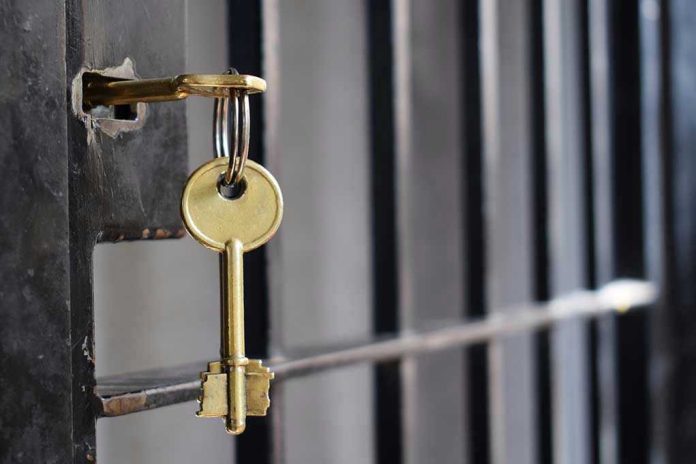
When the walls of La Santé prison closed around former French President Nicolas Sarkozy, the ghosts of Libya’s past followed him in, transforming his high-security cell into the epicenter of a decades-old vendetta that now threatens his life behind bars.
Story Snapshot
- Sarkozy, once France’s most powerful man, is now in solitary confinement under armed guard after inmates threaten to kill him to avenge Muammar Gaddafi.
- The threats stem from Sarkozy’s conviction for accepting illicit campaign funds from Gaddafi’s regime and France’s pivotal role in the Libyan leader’s 2011 downfall.
- His unprecedented incarceration exposes the raw intersection of international scandal, personal peril, and the French justice system’s uncompromising pursuit of accountability.
- The saga stirs debate over political vendettas, elite impunity, and the risks faced by high-profile prisoners ensnared in global controversies.
Sarkozy’s Descent: From Élysée Palace to Prisoner 2025
France’s political landscape convulsed when Nicolas Sarkozy, who once strode the world stage as president, was marched into La Santé prison to serve a five-year sentence for criminal conspiracy and accepting illicit millions from Muammar Gaddafi. The spectacle jolted a nation: never before had a French president crossed the threshold from head of state to convicted inmate. Within hours of arrival, murmurs of danger swept the prison corridors. Fellow inmates, emboldened by a potent mix of political grievance and notoriety, mounted a campaign of intimidation, releasing a video that left no doubt: “We’re going to avenge Gaddafi, we know everything, Sarko… we know everything. Give back the billions of dollars.”
Prison authorities responded with extraordinary measures. Sarkozy—accustomed to the gilded isolation of presidential office—was thrust into the starkest form of confinement: solitary, with police stationed in the next cell, a fortress within a fortress. The threats were not idle boasts. They carried the charge of history, echoing back to the moment, more than a decade earlier, when Sarkozy’s France led the NATO intervention that toppled and killed Gaddafi, unleashing chaos across Libya and setting off ripples that now lap at the doors of French justice.
The Scandal That Changed Everything
The roots of Sarkozy’s predicament stretch back to the murky years of 2005–2007, when, prosecutors allege, millions of euros flowed from Tripoli to Paris, bankrolling Sarkozy’s presidential ambitions. The allegations, long denied by Sarkozy, finally caught up with him in the relentless grind of the French legal system. In 2021, a separate corruption conviction foreshadowed his downfall, but it was the Gaddafi affair that sealed his fate. By 2024, after years of international investigations, damning documents, and testimony from Libyan officials, Sarkozy was sentenced—an outcome he branded a “judicial scandal.”
His fall from grace sent shockwaves through the French establishment. To many, Sarkozy became the embodiment of elite hubris, undone by the very deals and alliances that underpinned his rise. Yet to others—among them his wife, Carla Bruni, and a swath of loyalists—he emerged as a martyr, a victim of judicial overreach and political vendetta. President Emmanuel Macron, keenly aware of the case’s incendiary potential, walked a careful line, affirming judicial independence while acknowledging the emotional turmoil gripping the nation.
Inside La Santé: Security, Isolation, and the Specter of Revenge
La Santé, a fortress in Paris built to contain France’s most notorious offenders, was ill-prepared for a prisoner of Sarkozy’s stature and notoriety. The threats against him were immediate, credible, and chillingly specific. Inmates, energized by the legend of Gaddafi and the tantalizing prospect of “revenge,” forced the hand of prison authorities. Sarkozy was placed in total isolation—a double-edged sword, protecting him from physical attack but heightening the psychological strain. Police officers now occupy the cell next door, their presence a stark reminder that even within prison, power, danger, and history remain inseparable.
Security analysts have described the situation as unprecedented. French prison officials, already stretched by overcrowding and unrest, now face the daunting challenge of safeguarding a man whose every move is watched by both allies and enemies. Legal experts point out that while European leaders have occasionally faced prosecution, rarely has the fallout from international intrigue played out so viscerally within prison walls. The video threats, now circulating among prisoners and security officials alike, have set a new benchmark for the risks posed to high-profile inmates ensnared in political scandals with global reach.
The Fallout: What Sarkozy’s Ordeal Means for France and Beyond
Sarkozy’s plight has ignited debate far beyond the prison gates. Some see his conviction and imprisonment as a high-water mark for the rule of law, proof that not even presidents are immune from accountability. Others view it as a cautionary tale of politicized justice and the perils of turning prisons into theaters of international retribution. The immediate consequence is clear: the French corrections system must now reckon with threats and tensions unlike anything in living memory. Longer-term, Sarkozy’s case could reshape how France and other democracies handle the incarceration of political figures implicated in international scandals.
The saga has also reignited scrutiny of France’s interventions abroad and the shadowy world of campaign finance, raising uncomfortable questions for politicians and prosecutors alike. For Sarkozy himself, the stakes are existential: survival in an environment where past actions have turned fellow inmates into avengers, and history itself into a weapon. For France, the message is clear—when the justice system turns its gaze on the most powerful, the reverberations can shake the very foundations of the Republic.
Sources:
SMN News: Sarkozy faces threats in prison following conviction
Evening Standard: Police move to protect Sarkozy in prison after death threats




